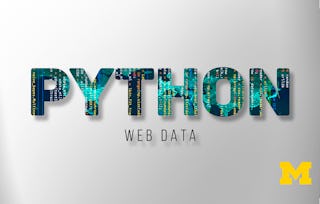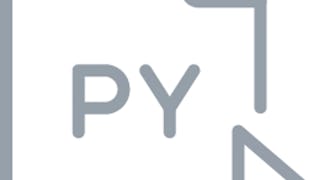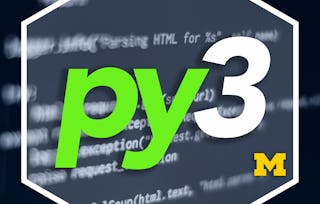This course teaches you to fetch and process data from services on the Internet. It covers Python list comprehensions and provides opportunities to practice extracting from and processing deeply nested data. You'll also learn how to use the Python requests module to interact with REST APIs and what to look for in documentation of those APIs. For the final project, you will construct a “tag recommender” for the flickr photo sharing site.

Data Collection and Processing with Python

Data Collection and Processing with Python
This course is part of Python 3 Programming Specialization

Instructor: Paul Resnick
113,307 already enrolled
Included with
4,041 reviews
What you'll learn
Fetch and process data from Internet services effectively.
Master Python list comprehensions for data extraction and processing.
Utilize the Python requests module to interact with REST APIs and navigate API documentation.
Skills you'll gain
Details to know

Add to your LinkedIn profile
2 assignments
See how employees at top companies are mastering in-demand skills

Build your subject-matter expertise
- Learn new concepts from industry experts
- Gain a foundational understanding of a subject or tool
- Develop job-relevant skills with hands-on projects
- Earn a shareable career certificate

There are 4 modules in this course
What's included
5 videos3 readings1 ungraded lab
In week one the video lectures and activities from the Runestone textbook will cover more complex data structures. By the end of this week, you will have learned how to process json formatted data, traverse nested data using nested iteration, and extract values from nested data.
What's included
13 videos1 assignment1 programming assignment8 app items1 ungraded lab
In week two you will be learning more advanced forms of accumulation. By the end of the week, you will have learned how to use the map and filter functions in combination with functions to transform or filter out data and store the resulting data in a new object. You will have also learned how to accumulate data using a list comprehension.
What's included
13 videos1 assignment1 programming assignment6 app items3 ungraded labs
In week three you will learn how to request data from the internet using Application Programming Interfaces (APIs). By the end of the week, you will have learned how to access data from a few APIs, cache data that you have requested, and also learned how to read and work with other APIs that were not touched on in the module.
What's included
25 videos2 readings1 programming assignment12 app items2 ungraded labs
Earn a career certificate
Add this credential to your LinkedIn profile, resume, or CV. Share it on social media and in your performance review.
Instructor

Offered by
Explore more from Software Development
 Status: Preview
Status: PreviewNanjing University
 Status: Free Trial
Status: Free TrialUniversity of Michigan
 Status: Free Trial
Status: Free Trial Status: Free Trial
Status: Free TrialUniversity of Michigan
Why people choose Coursera for their career

Felipe M.

Jennifer J.

Larry W.

Chaitanya A.
Learner reviews
- 5 stars
77.06%
- 4 stars
17.47%
- 3 stars
3.95%
- 2 stars
0.64%
- 1 star
0.86%
Showing 3 of 4041
Reviewed on Jun 7, 2020
Excellent. I learned a lot of useful information. The videos are good, and the final project put it all together ad a challenging exercise. Worth the time spend, that is for sure.
Reviewed on Oct 9, 2019
This was a really excellent course. The functional project at the end helped me understand how recommendation systems work and now I'm very excited to try to build a similar system for books I love.
Reviewed on May 16, 2020
I thoroughly enjoyed this course, and found myself often looking forward to Prof. Resnick's jokes. I also came to see the beauty and simplicity of Python. Great course. Great language.

Open new doors with Coursera Plus
Unlimited access to 10,000+ world-class courses, hands-on projects, and job-ready certificate programs - all included in your subscription
Advance your career with an online degree
Earn a degree from world-class universities - 100% online
Join over 3,400 global companies that choose Coursera for Business
Upskill your employees to excel in the digital economy
Frequently asked questions
To access the course materials, assignments and to earn a Certificate, you will need to purchase the Certificate experience when you enroll in a course. You can try a Free Trial instead, or apply for Financial Aid. The course may offer 'Full Course, No Certificate' instead. This option lets you see all course materials, submit required assessments, and get a final grade. This also means that you will not be able to purchase a Certificate experience.
When you enroll in the course, you get access to all of the courses in the Specialization, and you earn a certificate when you complete the work. Your electronic Certificate will be added to your Accomplishments page - from there, you can print your Certificate or add it to your LinkedIn profile.
Yes. In select learning programs, you can apply for financial aid or a scholarship if you can’t afford the enrollment fee. If fin aid or scholarship is available for your learning program selection, you’ll find a link to apply on the description page.
More questions
Financial aid available,

